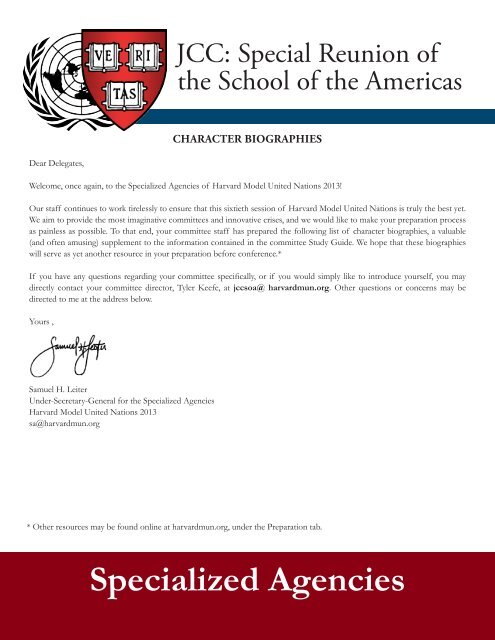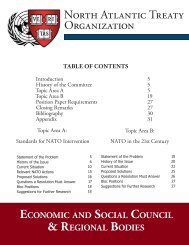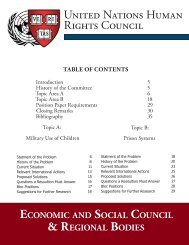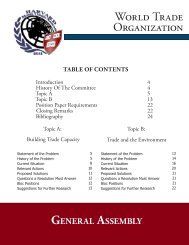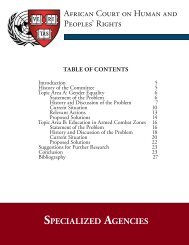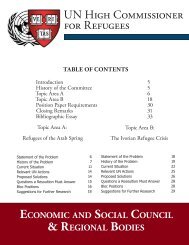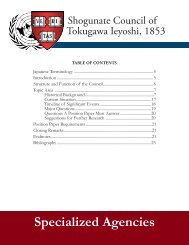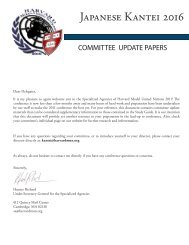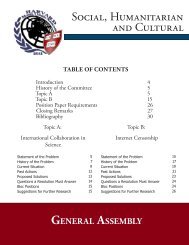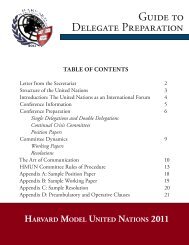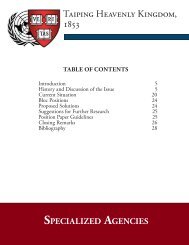Specialized Agencies - Harvard Model United Nations
Specialized Agencies - Harvard Model United Nations
Specialized Agencies - Harvard Model United Nations
Create successful ePaper yourself
Turn your PDF publications into a flip-book with our unique Google optimized e-Paper software.
JCC: Special Reunion of<br />
the School of the Americas<br />
Character Biographies<br />
Dear Delegates,<br />
Welcome, once again, to the <strong>Specialized</strong> <strong>Agencies</strong> of <strong>Harvard</strong> <strong>Model</strong> <strong>United</strong> <strong>Nations</strong> 2013!<br />
Our staff continues to work tirelessly to ensure that this sixtieth session of <strong>Harvard</strong> <strong>Model</strong> <strong>United</strong> <strong>Nations</strong> is truly the best yet.<br />
We aim to provide the most imaginative committees and innovative crises, and we would like to make your preparation process<br />
as painless as possible. To that end, your committee staff has prepared the following list of character biographies, a valuable<br />
(and often amusing) supplement to the information contained in the committee Study Guide. We hope that these biographies<br />
will serve as yet another resource in your preparation before conference.*<br />
If you have any questions regarding your committee specifically, or if you would simply like to introduce yourself, you may<br />
directly contact your committee director, Tyler Keefe, at jccsoa@ harvardmun.org. Other questions or concerns may be<br />
directed to me at the address below.<br />
Yours ,<br />
Samuel H. Leiter<br />
Under-Secretary-General for the <strong>Specialized</strong> <strong>Agencies</strong><br />
<strong>Harvard</strong> <strong>Model</strong> <strong>United</strong> <strong>Nations</strong> 2013<br />
sa@harvardmun.org<br />
* Other resources may be found online at harvardmun.org, under the Preparation tab.<br />
<strong>Specialized</strong> <strong>Agencies</strong>
JCC: Special Reunion of the School of the Americas<br />
Please Note: The following character biographies are intended to serve as additional source materials that delegates may draw<br />
upon in their portrayals of their assigned characters. Though the biographies are not strictly factual, the information contained<br />
within them is to be treated as canon for the duration of the conference.<br />
Leopoldo Galtieri — Argentina<br />
Leopoldo Galtieri was an Argentine army general and civil engineer who rose to power after the 1976 Argentine military coup.<br />
Born in 1926 in Caseros from a family of poor Italian immigrants, he enrolled in the National Military Academy at 17 and<br />
became an officer in the engineering branch. He attended the American-run School of the Americas in Panama in 1949. Early in<br />
his career Galtieri gained a reputation for believing that violence could resolve any territorial dispute. After 25 years of working<br />
as a combat engineer, Galtieri became the head of the Argentine engineering corps in 1975. He rose quickly through military<br />
ranks in the following years, helped by his strong support for the 1976 military coup and the resulting junta that seized control<br />
in Argentina. He became a high-up general in charge of the Second Army Corps in Rosario in 1978, in which he strongly stifled<br />
dissent about the new regime. In this role he was also responsible for Battalion 601, the intelligence unit in charge of what is<br />
called the “dirty war” in Argentina which killed and/or made vanish thousands of Argentinians. He became army commanderin-chief<br />
in late 1979, a position with the rank of a lieutenant-general. Alongside the other members of the military junta, Galtieri<br />
is in control of the Argentinian government.<br />
Jorge Videla — Argentina<br />
Jorge Rafael Videla was the de facto president of Argentina beginning in 1976 when he gained control through the military coup<br />
as head of the junta. Born in 1925 in Mercedes, Videla came from a prominent family in San Luis Province, with many relatives<br />
having held high political office. Following in the footsteps of his army colonel father, Videla graduated from the National<br />
Military College in 1944 and joined the Argentine Army. His success in the army led him to become a brigadier general by 1971<br />
and chief of the Army General Staff in 1973. President Isabel Peron appointed Videla as commander in chief of the military<br />
in 1975 due to pressure from the military, and from this position he reorganized the military, getting rid of those sympathetic to<br />
Peron. In the same year he led an army campaign against the People’s Revolutionary Army (ERP), which resulted in the death<br />
of hundreds of Marxists. Videla led the March 24, 1976 military coup that ousted President Peron and in the process became<br />
president of Argentina as leader of the governing three-man military junta. Videla vested all powers in the hands of the military<br />
and presided over the arrest, execution, torture, and/or kidnapping of thousands of left-wing guerillas, political opponents,<br />
and later journalists, educators, and intellectuals in Argentina’s “dirty war”. He instituted a free-market economy in Argentina<br />
but elicited strong international criticisms for his oppressive practices towards those on the left. While mostly involved in the<br />
economic sphere of government, Videla alongside the other members of the military junta was in control of the Argentinian<br />
government.<br />
Emilio Massera — Argentina<br />
Emilio Massera was a member of Argentina’s three-man junta that gained power after the 1976 military coup d’état and head of<br />
the country’s largest and notorious political prison. He was born in Buenos Aires in 1925 and attended Argentina’s elite naval<br />
academy in 1942 at age 16, becoming a midshipman in 1946. He attended the American School of the Americas, then in Panama,<br />
due to his strong opposition to Communism. By 1974 he was a full admiral and naval commander in chief under President<br />
Isabel Peron; Massera used this position to urge Peron to strongly fight guerilla groups and maintain public order. After the 1976<br />
military coup, Massera controlled the military arm of the junta until 1978. As head of the navy he also oversaw and operated the<br />
Naval Mechanics School (ESMA), a clandestine prison camp in Argentina’s “dirty war” where mysterious kidnappings, torture,<br />
rape, and ultimately execution were used against political prisoners and newborn babies of prisoners were trafficked. Massera<br />
was known for his oratory skills and his ambition to rise to great political prestige. He was the political face of the military junta,<br />
and alongside the other two members in control of the Argentinian government.<br />
2 <strong>Specialized</strong> <strong>Agencies</strong>
JCC: Special Reunion of the School of the Americas<br />
Hugo Banzer — Bolivia<br />
Hugo Banzer was dictator of Bolivia from 1971-1978, withstanding multiple coup attempts and leading a government criticized<br />
for many human rights abuses. Banzer was born in 1926 in Concepcion, Bolivia and attended the Bolivian Army Military High<br />
School in La Paz, from which he graduated as a cavalry lieutenant. He attended the School of the Americas in Panama, also<br />
traveling to Fort Hood, Texas to receive more training from the American Army and later going to Washington as a military<br />
attaché from 1967-1969. After serving in various government posts as minister of education and director of the military academy<br />
throughout the 1960’s, Banzer was exiled to Argentina in 1971 after leading a failed coup against leftist president General Juan<br />
Jose Torres. In August 1971, Banzer snuck back into Bolivia and led a military coup that ousted General Torres; he then declared<br />
himself president and instituted military rule. As president, Banzer presided over strong and violent censorship and repression<br />
of political opponents, culminating in his 1974 ban of political activity. During his dictatorship, tens of thousands of people<br />
are alleged to have been arrested and sought political asylum elsewhere. Banzer was overthrown in 1978 by his opponent in<br />
presidential elections and was exiled to Argentina. In 1979 Banzer returned to Bolivia and founded the powerful National<br />
Democratic Action (ADN) political party.<br />
Luis Arce Gomez — Bolivia<br />
In 1958 Luis Arce Gomez attended the American School of the Americas, taking courses as a communications and tactical<br />
officer. Arce Gomez was an ambitious army officer who was suspected of having close ties to Bolivian Drug Cartels. Arce-<br />
Gomez was appointed minister of the interior and was intimately involved with supporting and profiting from the cocaine<br />
trafficking industry in Bolivia; some gave him the nickname “Minister of Cocaine” because of this. Arce Gomez has also been<br />
known to favor economic liberalization within Bolivia.<br />
Raul Iturriaga — Chile<br />
Raul Iturriaga was a Chilean army general and member of the DINA (Directorate of National Intelligence), the Chilean secret<br />
police, under the military dictatorship of Augusto Pinochet. Born in 1938 in Linares, Chile, Iturriaga attended the Military<br />
School of the Americas in 1965 for Basic Airborne courses and later became a counter-insurgency strategy instructor. He joined<br />
the DINA in 1973 shortly after Pinochet’s successful military takeover and was named head of the Department of Foreign<br />
Affairs. In this role, he was involved in Operation Condor, a joint coalition with leaders in Argentina, Bolivia, Brazil, Paraguay,<br />
and Uruguay to get rid of political opponents and dissidents. After once again attending the School of the Americas in Panama<br />
in 1976, he became assistant director of intelligence for DINA in 1977 and later head of its Economic Department in charge of<br />
DINA firms. Iturriaga controlled Operation Colombo, the program which “disappeared” political opponents to Argentina while<br />
claiming they had committed suicide. He was also the director of the clandestine jail known as “The Sexy Blindfold” and “The<br />
Discotheque” because of the sexual abuse used on blindfolded prisoners while loud music masked their screams. As the head<br />
of Pinochet’s coercive apparatus, Iturriaga is a trusted representative of the Chilean government, still must consult Pinochet on<br />
most matters when it comes to international action.<br />
<strong>Specialized</strong> <strong>Agencies</strong><br />
3
JCC: Special Reunion of the School of the Americas<br />
Guillermo Rodriguez — Ecuador<br />
Guillermo Rodriguez was the military dictator of Ecuador from 1972-1976. Rodriguez was born in 1924 in Pujili, Chile. He<br />
studied at Eloy Alfaro Military School of Quito and later studied engineering. He taught at College Eloy Alfaro, at the School<br />
of the Americas in Panama in 1964, and in 1966 joined the staff of the Military Academy with honors from the President. In<br />
1971 Rodriguez was appointed commander in chief of the Army under the presidency of Jose Velasco. In 1972, Rodriguez<br />
overthrew the government of President Velasco after he was appointed chairman of the Military Council of Government;<br />
he then exiled Velasco to Argentina. Rodriguez took power at the time of a large oil boom in Ecuador and used oil profits<br />
to fund infrastructure construction. He announced military control, though many held out hope that his reinstitution of the<br />
1945 Constitution would lead to constitutional order once more. In 1974 Rodriguez withstood the attempted coup of General<br />
Gonzalez Alvear. Weakened from that attempt, the military peacefully removed Rodriguez from power in 1976. Rodriguez<br />
maintains a lot of political power in Ecuador, and holds the ear of most of the military and political elite within in the country.<br />
Roberto D’Abuisson — El Salvador<br />
Roberto D’Abuisson was a major in the El Salvadorian army and right-wing opponent of the Revolutionary Government Junta<br />
(JRG). He was born in 1944 in Santa Tecla and graduated from the military academy in 1963, becoming a rightist National Guard<br />
officer. In 1970 and 1971 he studied in Washington, D.C. at the International Police Academy (which was later closed due to<br />
claims of it teaching torture techniques). In 1972 he attended the School of the Americas, taking courses in communications.<br />
D’Abuisson joined the Salvadorian military intelligence and became part of the armed forces general staff in El Salvador in 1975.<br />
In following years he staunchly opposed pushes for land redistribution in El Salvador, particularly from Roman Catholic leaders.<br />
He formed the Union of White Warriors just before the start of the 1979 El Salvadorian civil war; this group was believed<br />
to be a death squad because of its role in the killing and torture of many, including a Roman Catholic bishop. As the head of<br />
paramilitary groups, and a talented officer, D’Abuisson is a trusted representative of the El Salvadoran government.<br />
Policarpo Paz Garcia — Honduras<br />
Paz has been President of Honduras since 7 August 1978, when he took control of the country in a bloodless coup d’état.<br />
Before that, he was a general and had recently been made head of the armed forces. Until a new president is elected, Paz will be<br />
the interim head of state. If these plans go ahead, it will be the end of 20 years of military rule in Honduras. These seemingly<br />
noble aims seem at odds with the reality of the actions of Paz’s government. There has been a marked increase in the use of<br />
state force in assassinations and torture of political opponents, and corruption permeates the highest levels of government. A<br />
drug lord financed the 1978 coup, and the current administration takes a cut of all the cocaine and marijuana trafficked through<br />
the country from Colombia. Policarpo Paz Garcia has the complete control of the Honduran government, and amicable<br />
relationships with drug cartels within Honduras.<br />
Efrain Rios Montt — Guatemala<br />
Ríos Montt attended the School of the Americas in 1951. He went on to play a role in the 1954 Guatemalan coup d’état<br />
organized by the CIA, which replaced the left wing President Jacobo Argun Guzman with the inept Colonel Castillo Arnos. This<br />
led to a series of coups, which ended in Guatemala breaking out into Civil War in 1960, in which it remains today. Ríos Montt<br />
was made Chief of Staff for the military in 1970, during the midst of the war. He is currently in charge of all military operations<br />
for the government, and holds tremendous political power within the country.<br />
4 <strong>Specialized</strong> <strong>Agencies</strong>
JCC: Special Reunion of the School of the Americas<br />
Otto Perez Molina — Guatemala<br />
Molina is a graduate of the School of the Americas who is currently a member of the elite counter-insurgency Kaibil unit in the<br />
Guatemalan army. This unit is highly selective and contains the best soldiers in the entire army. As the head of counter-insurgency<br />
operations, Molina is incredibly powerful within the country that is fighting a counter-insurgency civil war. His Talents as a<br />
military officer have not gone unnoticed by the chief of staff, and he is therefore a trusted advisor to the government, as well<br />
as a successful field commander.<br />
Manuel Noriega — Panama<br />
Noriega was born in Panama but has been trained in most of his military knowledge in the <strong>United</strong> States. He supported Omar<br />
Torrijos in his 1968 coup and was rewarded by the role of head of military intelligence as Torrijos took his current place as<br />
de facto leader of Panama. As the head of military intelligence, Noriega has been successful in suppressing almost all political<br />
opposition within Panama, and has formed strong relationships with the leaders of many Latin American Drug Cartels. While<br />
Torrijos is the ruler of Panama, Noriega has been known to act out on his own before receiving the blessing of Torrijos.<br />
Vladimiro Montesinos — Peru<br />
Vladimiro Montesinos is a graduate of the School of the Americas, was a Captain in the Peruvian army and from 1973-5 he<br />
was the military aide to the Prime Minister of Peru and Captain of the Armed Forces, General Jarrin. As the head of Peru’s<br />
Intelligence Service, SIN, he has been in charge of identifying and limiting political opposition within the country, as well as<br />
identifying foreign and domestic threats to the current regime. In this position, Montesinos has been able to develop a web<br />
of contacts with foreign intelligence services, and Peruvian cartels. After being released in 1978, he gained a law degree and<br />
currently works as a lawyer representing drug lords and corrupt officials.<br />
Juan Velasco Alvarado — Peru<br />
Velasco was the ruler of Peru from 1968 to 1975. He started out as a private in the Peruvian Army, before rising up to Chief<br />
of the Armed Forces by 1968. The government and congress in Peru in 1968 were unstable and had lost much public support.<br />
When a particular scandal erupted over oil fields, the army took the opportunity to seize power and Velasco was instated as ruler<br />
in a bloodless coup. Velasco was moderately left and during his rule Peru soon stood out as the only left-leaning government in<br />
South America. He instituted various social justice reforms and economic programs, which have so far been working, but seem<br />
to be slowing down. He aided Castro in Cuba and was a keen ally of the Soviet Union. As time went on, his administration also<br />
became less tolerant of dissent, cracking down on political activists and banning newspapers. Alvarado controls the government<br />
of Peru, with the help of advisors, particularly his head of intelligence, Vladimiro Montesinos.<br />
<strong>Specialized</strong> <strong>Agencies</strong><br />
5


